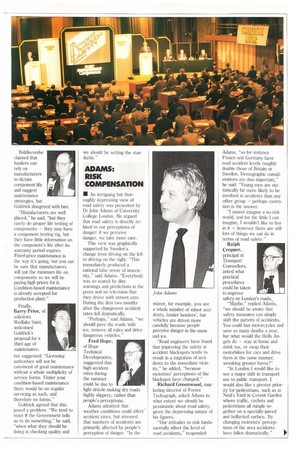ADAMS: RISK COMPENSATION
Page 29

If you've noticed an error in this article please click here to report it so we can fix it.
• An intriguing but thoroughly depressing view of road safety was presented by Dr John Adams of University College London. He argued that road safety is directly related to our perceptions of danger: if we perceive danger, we take more care. This view was graphically supported by Sweden's change from driving on the left to driving on the right. "This immediately produced a national false sense of insecurity," said Adams. "Everybody was so scared by dire warnings and predictions in the press and on television that they drove with utmost care. During the first two months after the changeover accident rates fell dramatically.
"Perhaps," said Adams, "we should pave the roads with ice, remove all rules and drive dangerous vehicles."
Fred Hope, of Hope Technical Developments, suggested that high accident rates during the sununer could be due to light drizzle making dry roads highly slippery, rather than people's perceptions.
Adams admitted that weather conditions could affect' accident rates, but stressed that numbers of accidents are primarily affected by people's perception of danger. "In the winter, for example, you see a whole number of minor accidents, fender benders', but vehicles are driven more carefully because people perceive danger in the snow and ice.
"Road engineers have found that improving the safety at accident blackspots tends to result in a migration of accidents to the immediate vicinity," he added, "because motorists' perceptions of the blackspot have changed."
Richard Greenwood, marketing director of Foster Tachograph, asked Adams to what extent we should be pessimistic about road safety, given the depressing nature of his figures.
"Our attitudes to risk fundamentally affect the level of road accidents," responded Adams, "so for instance France and Germany have road accident levels roughly double those of Britain or Sweden. Demographic considerations are also important," he said. "Young men are statistically far more likely to be involved in accidents than any other group — perhaps castration is the answer.
"I cannot imagine a no-risk world, and for the little I can imagine, I wouldn't like to live in it — however there are still tots of things we can do in terms of road safety."
Ralph Cropper, principal of Transport Counsellors, asked what practical procedures could be taken to improve safety on London's roads.. "Maybe," replied Adams, we should be aware that safety measures can simply shift the pattern of accidents. You could ban motorcycles and save so many deaths a year, but what would the Hells Angels do — stay at home and drink tea, or swap their motorbikes for cars and drive them in the same manner, wreaking greater havoc?"
"In London I would like to see a major shift in transport use to public transport. I would also like a greater priority for pedestrians, such as at Neal's Yard in Covent Garden where traffic, cyclists and pedestrians all mingle together on a specially-paved and bollarded surface. By changing motorists' perceptions of the area accidents have fallen dramatically."




















































































